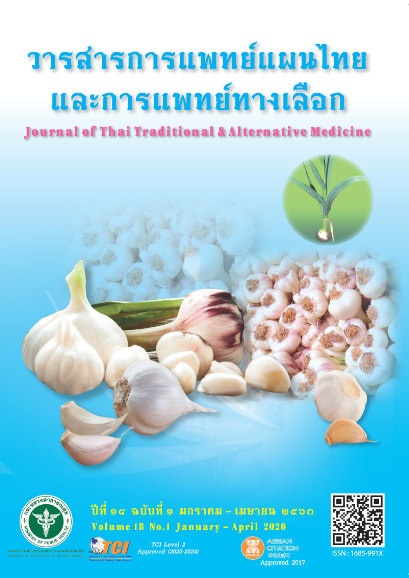Kui Ethnic Indigenous Healers’ Wisdom: A Case Study of Seven Indigenous or Folk Healers in Prasat Subdistrict, Huai Thab Than District, Si Sa Ket Province
Main Article Content
Abstract
This qualitative study aimed to explore the status, roles and knowledge or wisdom in treating illnesses among indigenous or folk healers in Kui ethnic communities in Prasat subdistrict of Si Sa Ket’s Huai Thab Than district. The study participants were seven folk healers purposively selected from those who had been recognized by the communities and had over 10 years of healing experience in the subdistrict. Data were collected using a questionnaire and in-depth interviews between June 2018 and June 2019, and then analyzed with descriptive statistics. The results revealed that, of all participants, five were male and two were female rice farmers. As folk healers, four were categorized as ritual blowing healers (moh phithikam pao khatha), and the rest were Phra-in folk-singing healers (mohlam phra-in) and traditional midwives or birth attendants. All of them were over 60 years old, had more than 10 years’ experience, and were highly respected by community members. Their chief motives for being healers included having a family member or ancestor serving as a folk healer, interest in such healing practice, and public-mindedness. The indigenous knowledge has been passed down from ancestors, teachers, and supernatural events through observations, history taking and physical examinations. Blowing healers normally do the incantation and blowing at the affected site while applying a herbal poultice or medicated oil, whereas a Phra-in folk-singing healer usually performs a ritual singing or dance to communicate with their former teachers or a ghost in the healing process, and a traditional midwife provides pre- and post-natal care, gives advice on boiled herbal drinks (to promote breastfeeding) and herbal bath. After such healing practices, follow-up care is also provided until the clients’ conditions improve. Such practices are regarded as alternative health care for the Kui ethnic communities.
Article Details
References
Banyat S. Kui ethnic Languages and legends. Journal of humanities and Social Sciences Mahasrakrm University. 2017. (in Thai)
Patthira P. Processes for transferring folk medicine healers’ wisdom about the use of herbs for treatment in communities of Loei province. Journal of humanities and Social Sciences loei University. 2018;52. (in Thai)
Thipwari S. local wisdom treatment of folk medicine men in Nakhon Ratchasima province. 2018;12:3 (in Thai)
Piyanuch Y. The study of folk wisdom in Ongkharak District, Nakhon Nayok Province. Faculty of Allied Health Sciences. Srinakharinwirot University; 2009. (in Thai)
Boonsri L. Wisdom of the folk doctor and Somnuai community. Isan Community Suan Sunandha Rajabhat University. 2011; Report No 53
Pornthip K. A study of folk medicine wisdom in Wang Nam Khiao district. Nakhon Ratchasima nationnal academic conference and presentation; 2015 June 18-19;
(in Thai)


